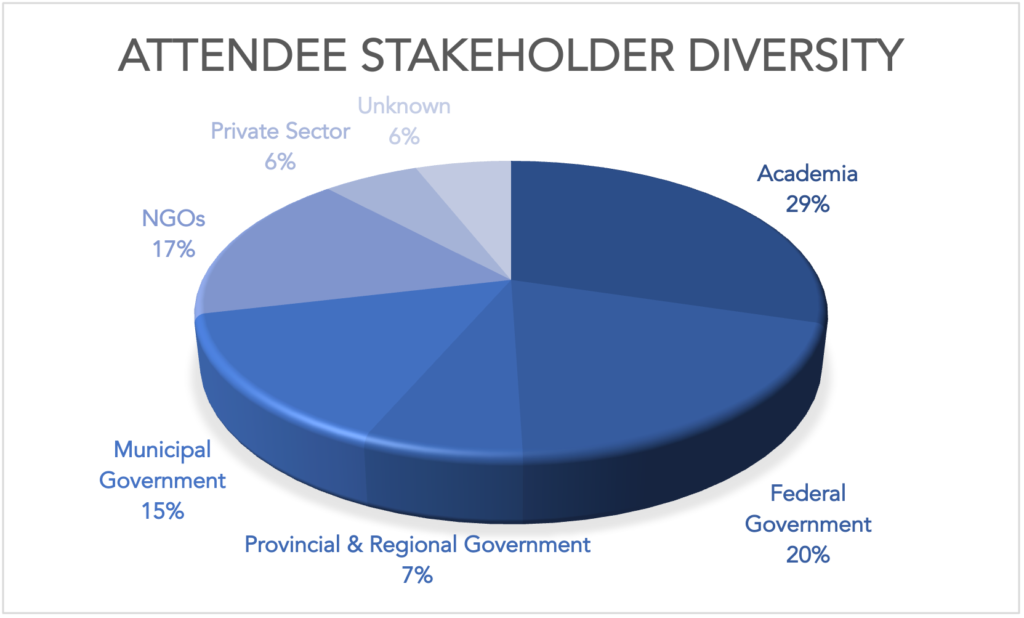As coastal communities around Canada face issues of coastal flooding, erosion, and sea-level rise, they need access to information for a coordinated approach across Canada.
Addressing this challenge, in May of 2022, the second MEOPAR National Forum on Coastal Community Resilience: Local Government Initiatives facilitated a national conversation with 120 participants. The event enabled knowledge sharing and networking among practitioners and researchers involved in coastal community adaptation to inspire future coordinated action. Panelists discussed government initiatives, such as the National Adaptation Strategy, in addition to diverse coastal adaptation initiatives and research from network stakeholders across the country including from Newfoundland, Nova Scotia, New Brunswick, Prince Edward Island, Quebec, the Arctic, and British Columbia. Breakout sessions on each day provided opportunities for discussions on themes like data availability, funding and coordination, and online resources, as well as more in-depth presentations on specific local initiatives. The 2022 Forum Report shares key learnings from the two-day Forum. The Report is available to read now. Here are some highlights.
Emerging cross-cutting takeaways
Throughout the event, five cross-cutting takeaways emerged:
- Transformational change and new ways of working are needed to enable large scale improvements in adaptation practices and regulations that incorporate risk;
- Adaptation solutions must be dynamic and use multiple tools to effectively manage high hazard areas;
- Longer term funding is needed. Funding for local government and NGOs as access to funding and short-term project-based funding limit effective adaptation strategies;
- Improvements to inter-jurisdictional coordination should be prioritized;
- Cross-sectoral partnerships play an important role in supporting local adaptation and regional collaboration.
Interdisciplinarity breeds innovation
Putting knowledge into practice, the National Forum attracts participants and speakers from various sectors, enhancing discussion and stimulating interdisciplinary networking and collaboration.

Attendees by sector. Government representatives comprised 42% of attendees, NGOs and the private sector counted for roughly a quarter. 29% of participants were from the academic sector.
The role of federal government in advancing climate change adaptation
The National Forum kicked off by addressing this question through a panel discussion, moderated by Canadian coastal resiliency expert, Prof. Jason Thistlethwaite. Panellists from Natural Resources Canada, Public Safety, Infrastructure, and the Canada Mortgage and Housing Corporation addressed the interconnectedness of both hazards and solutions, focusing on groups of systems rather than isolated assets, clarifying responsibility and facilitating collaboration.
The federal role in climate adaptation is primarily directed toward supporting provincial and municipal actors through coordination (as through the National Adaptation Strategy), funding (as with the Disaster Mitigation and Adaptation Fund), and data collection and mobilization (e.g., with the Flood Hazard Identification and Mapping program). The National Adaptation Strategy builds on 20 years of work, and identified key changes including: 1) better alignment of policies and tools, 2) solutions at appropriate scales, 3) doing more to leverage and encourage innovation, 4) adopting a longer-term adaptive management approach, 5) working with Indigenous knowledge holders, and 6) reflecting interjurisdictional perspectives. Infrastructure is an area of both risk and opportunity. The Infrastructure Canada Disaster Mitigation and Adaptation Fund (DMAF) was highlighted as a funding program from the federal government to support lower levels of government.
Stay engaged
The National Forum conveners encourage you to provide feedback on the National Adaptation Strategy at LetsTalkAdaptation.ca.



